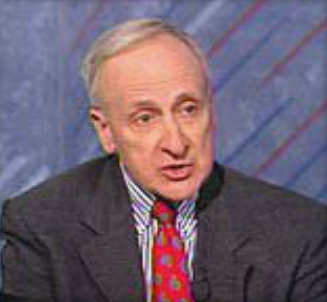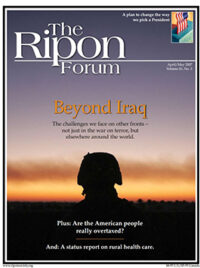
With 50 countries and a land mass that is about three and a half times the size of the United States, Africa is a continent that we can ignore or take it for granted only at our peril. In fact, if one were to make a list of U.S. foreign policy interests worldwide, they may be surprised to find that almost all of them are in play somewhere on the African continent.
Do we want to reduce our dependence on Middle East oil? Well, the Gulf of Guinea, running along the west coast of Africa from the big bulge to Angola, is becoming one of our major crude oil and liquefied natural gas suppliers. Nigeria is now the world’s seventh biggest oil producer at 2.5 million barrels a day, with Angola coming up fast to about the same level.
Many oil companies predict that this region will continue to grow as a major producer. While that clearly presents the U.S. with the opportunity to develop new resources, it also presents us with the challenge to keep these potential new resources secure. Indeed, although it is less volatile than the Arab Gulf, West Africa has real security problems. For example, a poverty-driven violent insurrection currently underway in Nigeria’s Delta region is jeopardizing almost a million barrels of daily production, and the fundamentals of this problem are still not being addressed.
And then there is the threat of terrorism. Nearly 10 years ago, Al Qaeda blew up U.S. embassies in Nairobi and Dar Es Salaam. Late last year, Al Qaeda-connected extremists were found to have infiltrated the home-grown Union of Islamic Courts that was trying to fill the governance vacuum of the 15-year old collapsed state in Somalia. Although Ethiopian military action succeeded in dismantling the Islamic “jihadist” militias, Somalia continues to be a hotbed of anarchy at the backdoor of Yemen and Saudi Arabia.
..if one were to make a list of U.S. foreign policy interests worldwide, they may be surprised to find that almost all of them are in play somewhere on the African Continent.
The good news is that Islamic extremism is being rejected throughout the rest of the continent by half the population of one billion people who are Moslem. In Sub-Saharan Africa, the Sufi form of Islam eschews religion in politics, and is highly tolerant of other religions and cultures. In part for this reason, U.S. cooperation with African governments on intelligence sharing, money laundering, and anti-terrorist military training is active and growing. For example, in the tiny Republic of Djibouti, at the southern entrance to the Red Sea, 1,200 U.S. Special Forces soldiers and civilian personnel are working not only to win the hearts and minds of those who live in the region, but to maintain military readiness in the event future threats arise.
U.S. security interests in Africa are considered sufficiently important to justify the recent creation of a new military combat command called AFCOM (for African Command.) AFCOM will be responsible for potential operations in every African country except Egypt. The continued existence in Africa of collapsed and failing states and their dangerous ungoverned spaces, as well as the need to protect energy supply lines, have raised Africa’s visibility within the U.S. national security calculus.
Where is Africa going fifty years after the end of colonial rule? As far as economic development is concerned, the results have been disappointing. Despite improvement since the end of the Cold War under World Bank mentoring, there is still no African “tiger” comparable to Malaysia, Thailand or Singapore. It is important for U.S. foreign interests that Africa does better in achieving self-sustaining economic growth. It is important that our substantial annual expenditures for food aid and humanitarian relief be replaced by expanded trade and investment.
U.S. development policy toward Africa has been particularly creative during the Administration of George W. Bush. The creation of the Millennium Challenge Corporation has begun the process of selecting and financing those African countries that show the most promise for true economic expansion and wealth creation. Debt relief and trade advantages for African exports have been broadened and deepened. More than any other President, George W. Bush has underscored the need and support for a vigorous indigenous private sector in Africa.
U.S. development policy toward Africa has been particular creative during the Administration of George W. Bush.
Africa is doing much better in another area of interest to Washington – democratization. More and more countries are enjoying peaceful transitions from one elected government to a successor. Democracy has become irreversible in about 10 African countries. African progress in this area stands in stark contrast to the unsavory choices in some Middle East countries between the corrupt elites or the radical Islamists. In this aspect, at least, Sub-Saharan Africa is in the vanguard.
Those of us who follow events in Africa daily are deeply frustrated and troubled by continuing tragedies such as the genocide in Darfur and the suicidal repression in Zimbabwe. But there is also great potential and significant hope that Africa will nonetheless take its place as a productive participant in the global economy. Countries like South Africa, Tanzania, Ghana, Mozambique and Botswana are moving in that direction.
The U.S. has learned a great deal over half a century about what works and what doesn’t in the context of African culture. This is no time to reduce our engagement with Africa. On the contrary, good opportunities are out there in terms of raw materials, agricultural innovation, abundant energy and hard working populations. Americans need to take advantage of this potential before India and China slip in ahead of us.
Herman J. Cohen is a former Ambassador to Senegal who served as Assistant Secretary of State for African Affairs under President George H.W. Bush. He is the author of “Intervening in Africa: Superpower Peacemaking in a Troubled Continent.”




